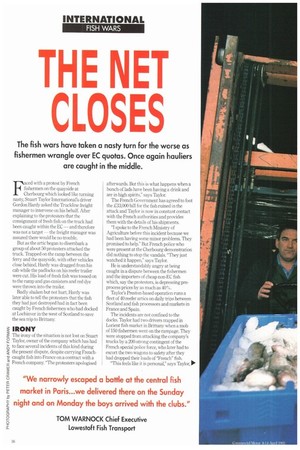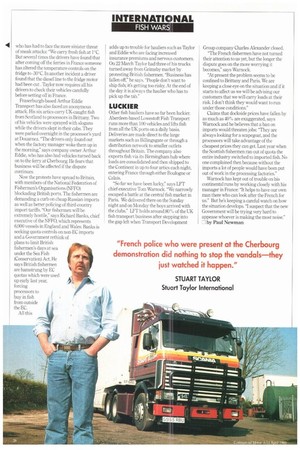THE NET CLOSES
Page 38

Page 40

If you've noticed an error in this article please click here to report it so we can fix it.
'aced with a protest by French -N
fishermen on the quayside at Cherbourg which looked like turning nasty, Stuart Taylor International's driver Gordon Hardy asked the Truckline freight manager to intervene on his behalf. After explaining to the protesters that the consignment of fresh fish on the truck had been caught within the EC — and therefore was not a target — the freight manager was assured there would be no trouble.
But as the artic began to disembark a group of about 50 protesters attacked the truck. Trapped on the ramp between the ferry and the quayside, with other vehicles close behind, Hardy was dragged from his cab while the padlocks on his reefer trailer were cut. His load of fresh fish was tossed on to the ramp and gas canisters and red dye were thrown into the trailer.
Badly shaken but not hurt, Hardy was later able to tell the protesters that the fish they had just destroyed had in fact been caught by French fishermen who had docked at Lochinver in the west of Scotland to save the sea trip to Brittany.
• i IRONY ci The irony of the situation is not lost on Stuart 2 Taylor, owner of the company which has had 8 to face several incidents of this kind during z the present dispute, despite carrying French. a 2 caught fish into France on a contract with a c2 French company. "The protesters apologised
afterwards. But this is what happens when a bunch of lads have been having a drink and are in high spirits," says Taylor.
The French Government has agreed to foot the £33,000 bill for the fish ruined in the attack and Taylor is now in constant contact with the French authorities and provides them with the details of his shipments.
1 spoke to the French Ministry of Agriculture before this incident because we had been having some minor problems. They promised to help." But French police who were present at the Cherbourg demonstration did nothing to stop the vandals. "They just watched it happen," says Taylor.
He is understandably angry at being caught in a dispute between the fishermen and the importers of cheap non-EC fish which, say the protesters, is depressing preprocess prices by as much as 40%.
Taylor's Preston-based operation runs a fleet of 40 reefer artics on daily trips between Scotland and fish processors and markets in France and Spain.
The incidents are not confined to the docks. Taylor had two drivers trapped in Lorient fish market in Brittany when a mob of 150 fishermen went on the rampage. They were stopped from attacking the company's trucks by a MO-strong contingent of the French special police force, who later had to escort the two wagons to safety after they had dropped their loads of "French" fish. "This feels like it is personal," says Taylor,l■ who has had to face the more sinister threat of sneak attacks: "We carry fresh fish at PC. But several times the drivers have found that after coming off the ferries in France someone has altered the temperature controls on the fridge to -30°C. In another incident a driver found that the diesel line to the fridge motor had been cut . Taylor now requires all his drivers to check their vehicles carefully before setting off in France.
Fraserburgh-based Arthur Eddie Transport has also faced an anonymous attack. His six artics carry UK-caught fish from Scotland to processors in Brittany. Two of his vehicles were sprayed with slogans while the drivers slept in their cabs. They were parked overnight in the processor's yard at Douarnez. "The drivers only found out when the factory manager woke them up in the morning," says company owner Arthur Eddie, who has also had vehicles turned back on to the ferry at Cherbourg. lie fears that business will be affected if the dispute continues.
Now the protests have spread to Britain, with members of the National Federation of Fishermen's Organisations (NFFO) blockading British ports. The fishermen are demanding a curb on cheap Russian imports as well as better policing of third-country import tariffs. "Our fishermen will be extremely hostile," says Richard Banks, chief executive of the NIFFO, which represents 6,000 vessels in England and Wales. Banks is seeking quota controls on non-EC imports and a Government rethink of plans to limit British fishermen's days at sea under the Sea Fish (Conservation) Act. He says British fishermen are hamstrung by EC quotas which were used up early last year, forcing processors to buy in fish from outside the EC.
All this
adds up to trouble for hauliers such as Taylor and Eddie who are facing increased insurance premiums and nervous customers. On 22 March Taylor had three of his trucks turned away from Grimsby market by protesting British fishermen. "Business has fallen off," he says. "People don't want to ship fish; it's getting too risky. At the end of the day it is always the haulier who has to pick up the tab."
LUCKIER
Other fish hauliers have so far been luckier. Aberdeen-based Lowestoft Fish Transport runs more than 100 vehicles and lifts fish from all the UK ports on a daily basis. Deliveries are made direct to the large markets such as Billingsgate or through a distribution network to smaller outlets thmughout Britain. The company also exports fish via its Birmingham hub where loads are consolidated and then shipped to the Continent in up to four artics each night, entering France through either Boulogne or Calais.
"So far we have been lucky," says LFT chief executive Tom Warnock. "We narrowly escaped a battle at the central fish market in Paris. We delivered there on the Sunday night and on Monday the boys arrived with the clubs." LFT holds around 80% of the UK fish transport business after stepping into the gap left when Transport Development Group company Charles Alexander closed.
"The French fishermen have not turned their attention to us yet, but the longer the dispute goes on the more worrying it becomes," says Warnock.
"At present the problem seems to be confined to Brittany and Paris. We are keeping a close eye on the situation and if it starts to affect us we will be advising our customers that we will carry loads at their risk. I don't think they would want to run under those conditions."
Claims that dockside prices have fallen by as much as 40% are exaggerated, says Warnock and he believes that a ban on imports would threaten jobs: "They are always looking for a scapegoat, and the processors will take advantage of the cheapest prices they can get. Last year when the Scottish fishermen ran out of quota the entire industry switched to imported fish. No one complained then because without the imports a lot of people would have been put out of work in the processing factories."
Warnock has kept out of trouble on his continental runs by working closely with his manager in France: "It helps to have our own man there who can look after the French for us." But he's keeping a careful watch on how the situation develops. "I suspect that the new Government will be trying very hard to appease whoever is making the most noise." 7 by Paul Newman












































































































